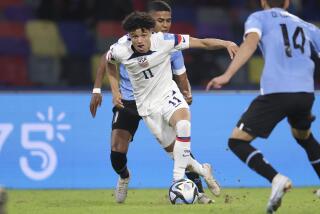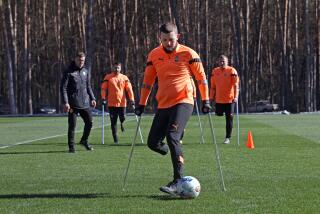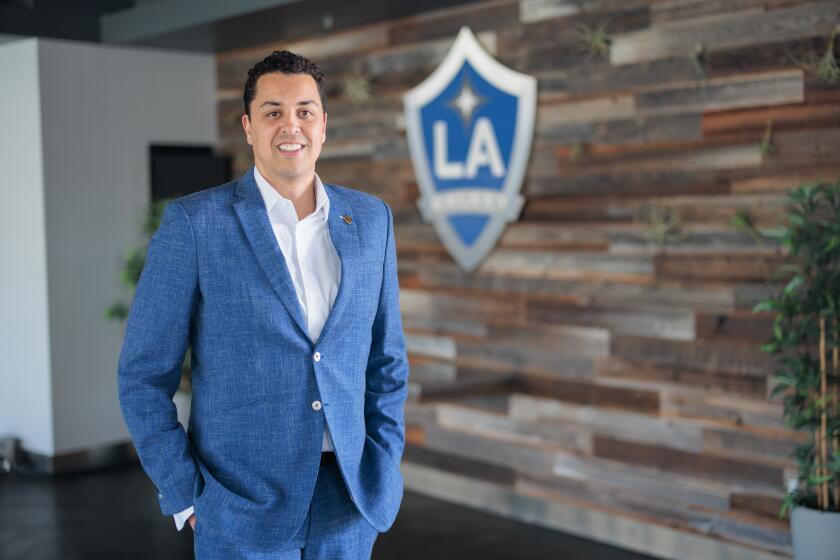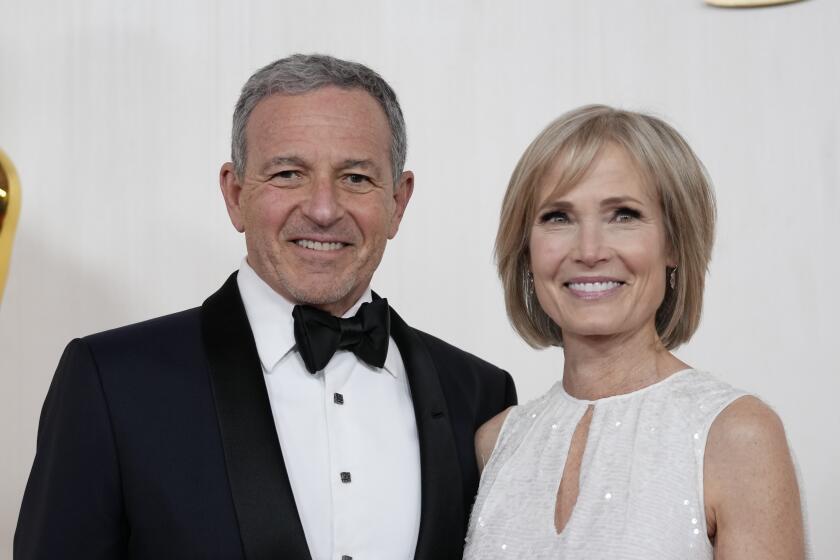World Cup â94 : WORLD CUP USA â94 / GROUP B PREVIEW : Workerâs Revolt : A Squabble Between Players and Coach Will Keep Russia From Putting its Best Team Forward
âI nspire? Our coach couldnât teach a pig to snort . . . . Can we talk shoes? . . . Boris, gotta put you on hold . My agentâs on line 2. . . . â
The Russians are coming.
And talking rubles. And sounding so much like the 1993 New York Mets itâs scary.
While few wax poetic about the good old days of Soviet repression, life in the new Russian fast lane has been no political picnic during a chaotic transition from communism to a free market.
And weâre only talking about the Russian soccer team.
Torn between old and new, the Russians arrive here in tatters, having exhausted themselves in the process of naming their 22-man squad that will open play June 20 at Palo Alto against Brazil, only perhaps the best team in the world.
As it stands, five of the nationâs top players, defiant to the end, were left behind: wingers Igor Dobrovolsky and Andrei Kanchelskis and forwards Sergei Kiriakov, Igor Kolyvanov and Igor Shalimov.
In the spirit of this disunity, Coach Pavel Sadyrin has said of the Moscow Five: âThey donât exist as far as Iâm concerned.â
â OK, comrades, now letâs go win a few for the mother country. â
The borscht hit the fan last winter and cut along ideological lines. Since the breakup of the Soviet Union, several of Russiaâs top players, suddenly free agents, signed lucrative deals with European clubs and tasted the free market.
The national team, however, is still run by the old Soviet apparatus--the Russian Soccer Union--which was accustomed to keeping players under thumb.
You could see the collision coming from the Kremlin to the Crimea.
Last November, after losing a qualifying match to Greece, 14 of the national teamâs players signed a letter to Shamil Tarpischev, Boris Yeltsinâs adviser for sports.
The players complained about Sadyrin, their coach, and demanded that Anatoli Byshovets the former national team coach, be reinstated. They also denounced what they considered meager pay and poor training conditions.
At the crux of the issue was a shoe contract the Soccer Union signed with Reebok without consent from the players, many of whom had separate shoe deals with other companies.
This was, of course, the problem that Michael Jordan, a Nike man, faced as a member of the 1992 Olympic basketball team, sponsored by Reebok.
Jordan âsolvedâ his problem on the gold medal podium by covering the Reebok emblem with an American flag.
Once, the prospect of this sort of thing happening in Russia would have been unthinkable. In fact, the Jordan incident surely would have amused Soviet propagandists in the war against imperialism.
Did Lenin turn over in his tomb?
âItâs a mixed bag,â said Robert Edelman, a professor of Russian history at UC San Diego. âIs the ego and greed of western sports admirable? Now that is part of the Russian system. But before, the bureaucrats told them what to do, and that wasnât good either.â
Edelman has been closely watching the exploits of the Russian soccer team. He recently authored a book, âSerious Fun: History of Spectator Sport in the USSR,â and will serve as a World Cup correspondent for Sports Express, a daily independent newspaper in Russia.
Since the initial rebellion, most of the Russian soccer players backed down from their ultimatums, deciding to put country first.
The players had little recourse.
Throughout, the Russian soccer union, led by President Viacheslav Koloskov, staunchly backed Sadyrin.
Not to say there will no hard feelings. Edelman says players are rebelling against the old system, of which Sadyrin was a part.
âHe is known as a good, tough coach,â Edelman said, âbut is probably not the best personality to coach an all-star team. Youâre dealing with fairly inflated egos, something he is not used to. Heâs from the old school of Soviet coaches, which were more dictatorial.â
The internal bickering is bound to have an effect on Russian fortunes. While not considered tournament favorites, they would have been considered a formidable opponent before the implosion.
Of the Forgotten Five, Kiryakov was a star forward for Karlsruhe, a German club. Shalimov was a $1-million midfielder for Italyâs Inter Milan, and Kanchelskis was a top midfielder for Manchester United in England.
Now, Edelman does not envision Russia reaching the round of 16.
The irony is that Russian soccer in the new era appears more suited to becoming a world soccer power. For a nation of its population, the Soviet Union had finished no better than fourth--1966--in seven World Cup appearances.
Edelman contends soccer suffered under the old regime.
âThe travesty of the Soviet system,â Edleman explained, âwas they they won all these (Olympic) medals in sports nobody cared about. In the one sport everyone cared about, soccer, they had trouble internationally. I think the Olympic sports drained the athletic talent.â
Even Sadyrin conceded recently that winning the World Cup would be âa miracle on the scale of flying saucers.â
Yet, the Russians are not without hope, nor talent. They are led by forwards Vladimir Bestchatnykh, Sergei Yuran and Alexander Mostovoi and a pair of quality goalkeepers: Dmitri Kharine and Stanislav Cherchessov.
And never underestimate the power of greed. If the Russians advance to the round of 16, each player will receive a $20,000 bonus, about what the average Russian can expect to earn in a decade.









